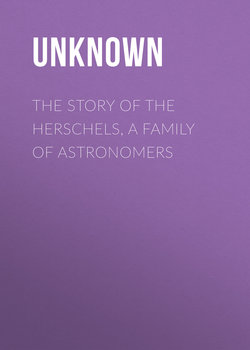Читать книгу The Story of the Herschels, a Family of Astronomers - Unknown - Страница 4
На сайте Литреса книга снята с продажи.
CHAPTER III
ОглавлениеIn August 1782 the Herschels removed to Datchet. Their new home was "a large neglected place; the house in a deplorably ruinous condition, the garden and grounds overgrown with weeds." Nor were the domestic arrangements more favourable. For a fortnight the little family were without a female servant; and an old woman, the gardener's wife, showed Miss Herschel the shops, where the high prices of every article, from coals to butcher's meat, appalled her. But of these inconveniences Herschel took no account. Enough for him that he was released from the drudgery of teaching, and free thenceforth to devote himself to the heavens and their wonders. A man whose thoughts are always with the stars can hardly be expected to trouble himself about the price of tallow-candles! Were there not capacious stables in which mirrors of any size could be ground; and a roomy laundry capable of easy conversion into a library, with one door opening on a large lawn, where the "small twenty-foot" was to take its stand? Compared with advantages such as these, what mattered the scarcity of "butcher's meat"? Herschel laughingly assured his sister that they could live on eggs and bacon; which, he confidently asserted, would cost next to nothing, now that they were really in the country!
And so he settled down to a life of quiet, industry at Datchet; his admirable sister being formally adopted as his assistant and secretary. Never had master a more devoted, a more enthusiastic, or a more intelligent servant! She shared in all his night-watches, with her eye constantly on the clock, and the pencil in her hand; with unerring accuracy she made all the complex calculations so frequently required; she made three or four copies of every observation in separate registers, co-ordinating, classifying, and analyzing them. If the scientific world, says Arago, saw with astonishment the unexampled rapidity with which Herschel's works succeeded one another for many years, they were greatly indebted for this affluence of production to the affectionate ardour of his sister Caroline. Her enthusiasm never failed; her industry knew no check; and her brother's fame was dearer to her than life.
In one of her letters she describes with graphic simplicity the "interior" at Datchet:—
"I found that I was to be trained for an assistant-astronomer; and by way of encouragement, a telescope adapted for 'sweeping' (or rapidly surveying a wide extent of space), consisting of a tube with two glasses, was given [to] me. I was to 'sweep for comets;' and I see by my journal that I began August 22nd, 1782, to write down and describe all remarkable appearances I saw in my 'sweeps.' But it was not till the last two months of the same year that I felt the least encouragement to spend the starlit nights on a grass-plot covered with dew or hoar-frost, without a human being near enough to be within call. I knew too little of the real heavens to be able to point out every object so as to find it again without losing too much time by consulting the Atlas. But all these troubles were removed when I knew my brother to be at no great distance, making observations with his various instruments on double stars, planets, and the like; and I could have his assistance immediately when I found a nebula, or cluster of stars, of which I intended to give a catalogue. I had the comfort to see," she continues, "that my brother was satisfied with my endeavours to assist him when he wanted another person either to run to the clocks, write down a memorandum, fetch and carry instruments, or measure the ground with poles,—of which something of the kind every moment would occur."
The conscientious care and assiduous industry with which Herschel made his measurements of the diameter of the Georgium Sidus (now called Uranus), and his interesting observations of other planets, of double stars with their coloured light, of cometary and nebulous appearances, were truly remarkable; as may be seen by the various papers which he wrote at this time for the Royal Society. In addition to all this labour, he perfected a twelve-inch speculum of vast magnifying power before the spring of 1784; and many hours were spent at the turning-bench, as not a night clear enough for observing ever passed without the devising of improvements in the mounting and motion of the various instruments then in use, or the test and trial of newly-constructed "eyepieces," most of which were executed by Herschel's own hands. "Wishing to save his time, he began to have some work of that kind done by a watchmaker, who had retired from business, and lived on Datchet Common; but the work was so bad, and the charges [were] so unreasonable, that he could not be employed. It was not till some time afterwards, in his frequent visits to the meetings of the Royal Society (made in moonlight nights), that he had an opportunity of looking about for mathematical workmen, opticians, and founders. But the work seldom answered expectation, and it was kept to be executed with improvements by Alexander during the few months he spent with us."
